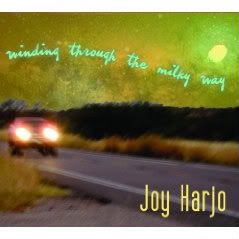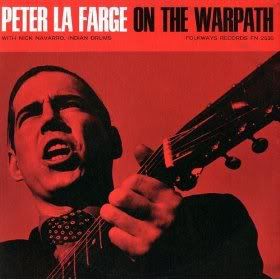The first time I burned a Joy Harjo CD into my itunes, I cringed at the sight of the “world” genre listed by the album. But, now I think that “world” might be appropriate in the right context.
Harjo takes us on journey in what is being called Harjo’s “breakthrough” album, Winding Through the Milky Way. But, she reminds us that the journey is a story.
We’re in a story that will always include the ancient while riding to the outer edge. We’ll get there with music, poetry, lyrics, stories, sheer sorrow, and joy.
Songs are yet another form of healing, another form of telling, and another form of surviving. Songs are alive.
The journey—the music—takes us to the place where we can see and experience the power of song. In Harjo’s Mvskoke tradition, the milky way is an avenue that can take us to a different place. I wonder if it doesn’t take us to an alternate world/reality.
I will answer in the clatter […]
Yes, I will reply, I have buried the dead
and made songs of the blood, the marrow
“My Heart” is one of my favorite tracks off Milky Way. The song is featured as a poem in Harjo’s collection A Map to the Next World. “Our skin is the map,” she says, our bodies know how to help us get there, but we travel on the waves of sound produced by music.
“My Heart” opens with the sound of turtle rattlers, shaking that familiar “native” beat; the saxophone enters, adding warmth and density. But, saxophone also speaks for itself, even as it speaks to us and alongside us, with the faint sound of chanting in the background.
Start with a voice. Let it fly free. Bring in a saxophone to touch those places the words can’t reach.
In fact, nothing competes for attention in the composition of the music—everything works in tandem. Sonically, the airiness and “breathiness” of the entire album reminds us of life and movement—of journey.
And, the sonic progression of various tracks is more circular than linear, taking us back, while reminding us of the present and connecting it to a future that is visible, “We were there when Jazz was invented,” she says, as she breaks into a sax solo. And we are still (re)inventing jazz and songs. And by asserting that, we assert sovereignty, and by asserting it through song, we use our bodies as much as we use instruments.
Add an insatiable guitar, some heavy philosophical bass, a little piano, some Mvskoke and other tribal rhythms, to take us back to Congo Square and before, back up into the Milky Way.
So, as I stare at the "world" category that Harjo has been ascribed to, I think that it's a fitting description of what her work does. It takes us on a journey, using our bodies to map the way there—to remember the way—to another world that is inside of this world.
READ ON...

